The non-jock’s guide to jocks
The other day, I visited a sports doctor, who wanted to know all the physical activities I did.
“Well, let’s see. Weight lifting obviously. Brazilian jiu-jitsu. Judo. Boxing. Grappling — that’s like BJJ without the pyjamas. Climbing. Cycling. Running. Occasionally I’ll drop in to the pool for some swimming. Hiking. Skating. Surfing is fun when I can do it. I like snorkeling too… one day I’d like to play rugby…”
I trailed off as she waved her hand in the “shut up, that’s enough” gesture.
At some point in my life, I became a jock.
To be more accurate, a fake jock.
A poser jock.
Someone who has one pair of sorta-high-heels stuffed way back in the closet (which are used for salsa dancing lessons rather than dressing up), and 20 pairs of running shoes. Someone who does a lot of physical stuff. Who can lift a few weights and do a few rounds of sparring without barfing up a lung.
I know my way around a gym.
I know the stink of unwashed athletic gear and Tiger Balm and wet towels. I know how to tape sprained fingers and broken toes, and how to pop a dislocated shoulder back in (I’ve done it twice, matside).
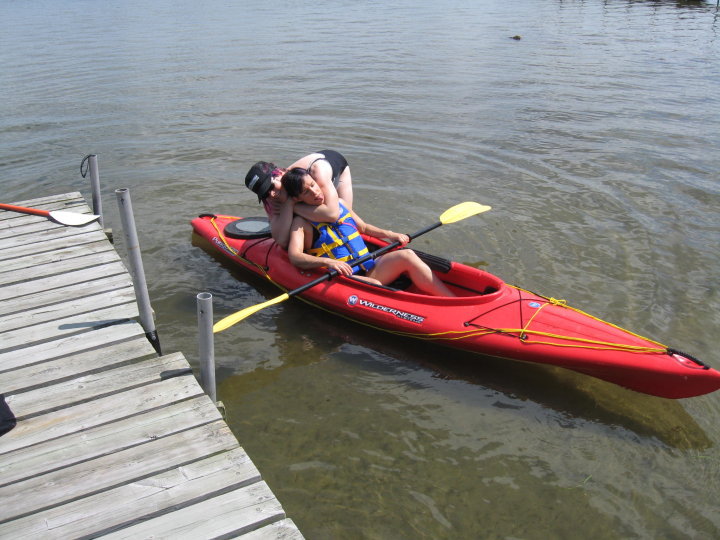
In fact, apparently at some point I invented a combination of submission grappling and kayaking.
But I’ve never had any discernible athletic career, along the lines of, “When I played for the international women’s extreme volleyball team…” or “When I took bronze at the ski jumping competition in Switzerland…”
I avoided sports as much as physically possible for my entire childhood, to the point of literally hiding in the gym changeroom during class.
I’ve got one sneakered foot in the jock world and one sneakered foot out of it.
If you’re new to working out, or have some childhood trauma around jocks, you might feel intimidated by gyms and other physical activities.
Maybe your pre-teen nickname — perhaps given to you by a jock when you were 11 — was Spaz, Geek, Fatso, or Loser.
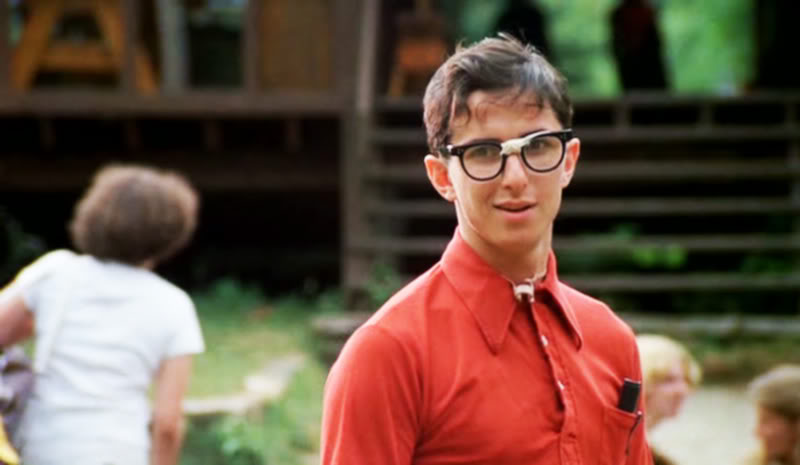
Jocks might seem like mean, scary people.
And of course, when you were 8 years old, some of them were.
They were the kids who’d whip shit at your head with their natural-athlete reflexes and yell “Think fast, dork!” as the projectile smashed you in your four-eyed face.
Or perhaps — as people — they were not particularly scary, but they just happened to be part of an overall site of public humiliation.
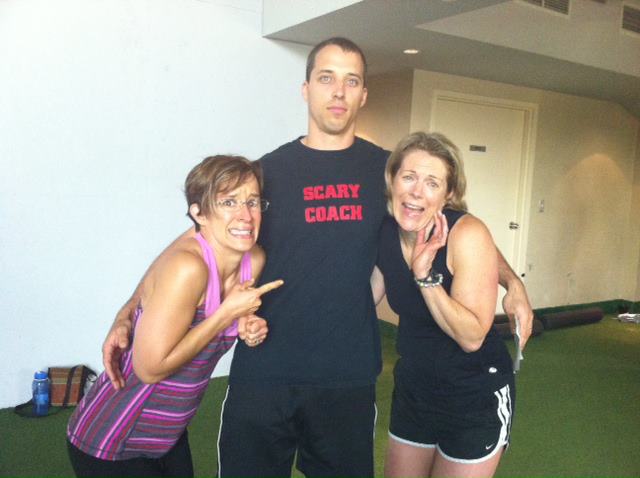
Me with Brian St. Pierre, who is not at all scary.
But things change.
As I got older, I realized that even if you were an Olympian in your 20s, you’re very likely not super active in your 40s. The playing field is a little more level, so to speak.
I also realized that as an adult, you get to re-invent the rules.
You don’t have to be scared of jocks and gyms just because you sucked at baseball in third grade.
Don’t let your childhood trauma or stereotypical assumptions hold you back from being active.
So for all of you out there who still rock back and forth and suck your thumb whenever you see a sphere being thrown, this is for you.
The non-jock’s guide to jocks
Yes, “talent” is a thing. But practice is way, way, way more important.
At some point in North America, most of us got the idea that some people are “natural athletes” and the rest of us are sad, uncoordinated sacks of crap who shouldn’t even bother trying.
It’s true that some people are naturally bigger, stronger, faster, and more kinesthetically aware (like Wayne Gretzky who simply skated to where the puck would be, not where it was in the present moment).
Some people are the right shape (like Michael Phelps, who’s basically a long V-shaped stalk with flippers). Some people’s muscles attach at better points on their bones, which makes them naturally more powerful.
Some people have the ability to lock on to their sport of choice as a toddler, with single-minded focus, and never let go.
And so on.
But you still have to show up for practice. Over and over and over and over.
Had Serena Williams or Ronda Rousey not put in hundreds of thousands of hours of practice, they’d probably be working in an insurance office somewhere, thinking “Fuck my life.”
Even “natural athletes” are not amazing at things when they first try them.
They often suck just as much as the rest of us shlubs.
The difference is that athletes keep trying.
They keep showing up. Keep chasing the skills.
They put that gym bag into the car trunk at 5 AM and drive to practice, rain or shine.
Jocks find the sports that suit them and their natural body types.
Nadia Comaneci would have been a crappy basketball player. Flo-Jo and Marion Jones’ legendary ability to crush 100 metres would have been wasted in ultramarathoning. You could probably fit two gymnasts inside Serena Williams.
One reason jocks look so natural and effortless is that they’re fish in water, not fish trying to climb trees.
Jocks trade off a lot for their athletic career.
Forget the media image of pro male NBA or NFL players covered in expensive clothes and pretty ladies.
The reality of athletic careers is more like this:
Wake up at 4:30 AM to get to the training facility for 5:45.
6-8 AM – Training session #1.
8 AM – Shower, get to class or work.
12 PM – Training session #2 – strength & conditioning.
2 PM – Shower, get back to class or work.
5 PM – Training session #3, for another 2-3 hours.
8 PM – Come home, microwave frozen pizza, do laundry, pack bag for tomorrow, fall into bed.
Wake up at 4:30 AM. Meet teammates at parking lot at 6; get on bus.
6-10 AM – Drive to tournament.
10-5 – Tape up fingers and toes, put on knee brace, take painkiller. Compete in multiple tournament rounds.
6 PM – Hit McDonalds before getting on the bus to go home. Ice something on the way home.
Not exactly glamorous.
At the height of an athletic competition career, most athletes don’t really date. They’re not on a high-powered job track. They don’t really have hobbies. Many amateur athletes are also going to school or working part-time to support their training.
Basically, they just train and eat and sleep and do laundry and try to pay rent (or live in a dorm) and put ice packs on things and sit in airports or on buses.
Which brings me to my next point:
Jocks usually have an incredible work ethic.
If you want something done, hire an ex-jock.
They’re used to juggling the aforementioned schedule, plus stuff like being punctual, following rules, and putting in their best effort.
Most of them believe there’s a direct relationship between input and output. Their solution to a tough problem is to work harder.
Jocks know that the difference between good and great is about 20,000 repetitions.
If they seem impatient with you and your excuses, it’s because their excuses died when they were 13 and coach snapped them with a wet towel for complaining.
Jocks usually like feedback.
Many jocks are externally motivated by things like achievement, social recognition, and being the best. Plus, they’re always getting feedback from their coaches about how they’re doing, what to improve, etc.
Most jocks are happiest with a constant stream of accomplishments, input, feedback, and guidance.
Say “good job” to a jock and watch them beam.
Well, sometimes.
Because:
Jocks find it hard to be happy with things.
The same fundamental drive to improve, and the desire to be the best, that pushes them to compete at the highest levels also has a downside: It often leaves jocks feeling vaguely dissatisfied at all times.
They often walk around thinking:
Could this all be somehow… better?
Could I be somehow… better?
Great if you’re pushing for world-class excellence; not so much if you’re 45 and just trying to figure out how to live a normal life.
Jocks probably hate their bodies more than non-jocks do.
Think about it this way.
Let’s imagine a world-class opera singer, and a 3-year-old.
The opera singer has trained for 30 years to be the best in her field. She has perfect pitch and can hear notes that only dogs can. She’s sung in the most resplendent opera houses in the world. She can recognize micro-deviations in acoustics. She knows that opera audiences can be harsh and unforgiving.
Meanwhile, the toddler is belting out — wrongly and horribly — all the songs from Frozen. She gives zero fucks about pitch, timing, vocal quality, or even getting half the words right. She sings mostly to her stuffed cat.
Who’s probably happier with their voice?
Same idea with jocks and non-jocks.
If a jock is 10% body fat, he probably thinks he should be 8%. If he’s 8%, he probably thinks he’s a fat bag of Jell-o and should be 4%.
If a jock runs a marathon in 2:30, she hates herself because there are at least 2604 women who’ve run it faster.
Meanwhile, the non-jock who just lost 10 pounds and who can now climb a flight of stairs without huffing and puffing feels like a superstar.
Jocks often age worse than normal people.
Jocks depend on their bodies. But bodies are rarely dependable.
Bodies can give out literally in a millisecond. Your athletic career could be over in a single moment.
Unlike the rest of us normal knowledge-working drones, who hit our intellectual peak around midlife and then slowly drift into irrelevance over subsequent decades before finishing things out in a Florida condo, athletes often have a single, shocking, painful end to their careers.
Like this:
6:20 PM – On top of the world! You are the fucking WOMAN!!! Yeah buddy! Next year you go pro!
6:21 – Crack.
6:22 – Well, hope you enjoyed the free snacks because your career is done at age 21. See if you can at least hit on the cute paramedic on the way out.
So naturally, there’s a little bit of bitterness.
Also, many jocks stop having fun in their sport around their teenage years, when it becomes a job.
All the joy gets sucked out somewhere between having a sport parent scream at you, an oh-dark-thirty morning practice, your fourth finger dislocation or second shoulder surgery, or crying because you came in third.
Once they finish competing, many athletes quit their sport for good. Some of them absolutely loathe it by then.
As Andre Agassi wrote, “I play tennis for a living though I hate tennis, hate it with a dark and secret passion, always have.”
What this means: As soon as the pressures of competing are gone, many athletes actually become totally inactive. If you’re a recreationally active 40-year-old, you might literally run laps around a former Olympian.
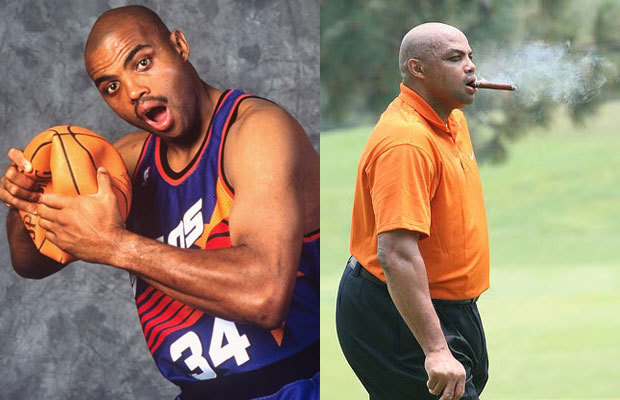
Exhibit A: Former NBA player Charles Barkley.
Jocks are often incredibly good people.
One of my first meetings with a high-level athlete was a guy named Matt.
I was teaching undergrads and Matt — a nationally-ranked amateur hockey player — was one of my students. Every class he was there, 10 minutes early, shiny and sparkling, ready to pay attention.
He insisted on calling me Mrs. Scott-Dixon.
I told him: “No need for that. Just call me Krista.”
He said he couldn’t. His athletic career had taught him: You always show respect to your seniors. He needed some kind of honorific.
“All right”, I said. “You can call me Dr. Scott-Dixon or Professor Scott-Dixon. Take your pick.”
He smiled. That would work for him.
As long as he could find his place in a social order of rules and regulations, he was happy.
Oh by the way, he was an A student. In a gender studies class.
Scratch the surface of most jocks and you’ll find the equivalent of an Eagle Scout — someone who cares about contributing, someone who wants to help their teammates, someone who believes in the common benefit, and someone who wants to do a good job.
To be a jock often means you’re embedded in a world of hard work, showing sporting conduct, trying your best, and being a courteous winner and loser.
Although the stereotype (and reality) of the asinine teenage football player is loud and proud (and don’t get me wrong, I met a lot of those jerkoffs while going to high school in a small town), they’re actually more the exception than the rule.
For every loudmouth dickheaded meat mountain giving out wedgies and swirlies, and every chest-pounding bodybuilder hogging the mirror at your local gym, there are 10 athletes who are quietly and politely doing their jobs.
Because most serious athletes spend their teenage years competing (which cuts out a lot of opportunities for drugs, booze, partying, and other teenage shenanigans), they miss the major window of learning to be assholes.
If you’re an asshole on a team, and everyone else hates you, you rarely make the long-term cut. You’d better be an epic fucking goal scorer if you’re an asshole, because otherwise you won’t survive the Lord of the Flies-style “voted off the island” social filtration process.
As adults, former jocks are often excellent friends, colleagues, and companions.
Jocks who become trainers, teachers, and coaches usually do so because they genuinely want to help people.
If they come off a little bit like Mr. Woodcock or the guys from Pain and Gain, it’s usually not because they’re jerks — it’s because they want to fix your busted shit, share their joy of physical activity, and make you feel better.
And sometimes they get a little over-enthusiastic, or puzzled about why the Coach Hardass routine — which they loved — doesn’t work for non-jocks. (Which is why we created the Level 2 coaching program at Precision Nutrition.)
What can non-jocks learn from jocks?
If you’re a non-jock, and missed the first few decades or so of being a jock, no problem.
You can still learn the things they learned, and reap the benefits of Jock Lore.
Here are some things you can take away immediately:
- Talent is overrated. Show up for practice.
- Be consistent. Repetition is what makes the magic.
- Build your skills. Drill, baby, drill. Break things down into their simplest parts, and practice them over and over.
- Be patient. Give it time. Let your body and brain adapt.
- Let yourself suck at first. NHL players who can skate backwards at 80 miles an hour started as wobbly kids who couldn’t lace up their own skates, face-planting on the ice. There’s no relationship between how good you are on day 1, or day 10, and how good you are on day 1000.
- Suck it up and take feedback. Ask for guidance, coaching, and mentorship. Watch yourself on video, with someone helping you analyze your technique. Reward your coaches’ honesty with a genuine desire to improve. Dump your ego.
- Instead of “anxious”, say “excited”. Adrenaline is competition energy. Use it.
- Don’t go at it alone. Be a good winner and loser. Help your teammates. Even solo-sport jocks have coaches and helpers.
- Find the sports that fit YOUR body. Of course, feel free to do the others, too.
- You don’t have to go right to the Olympics. Jocks don’t. They start as tiny tee ball players. If there’s an activity that interests you, find a beer league.
- Expect to find friends in any activity you try. Jocks like to play. They’ll be excited to share that with you.
- Love a jock today. Tell them they did a good job. Give them a gold star. They’ll be your buddy for life.
- Remember: It’s just sports. Despite what sobbing and screaming fans would tell you on Big Game Day, there’s nothing serious about moving a ball around. Have fun.
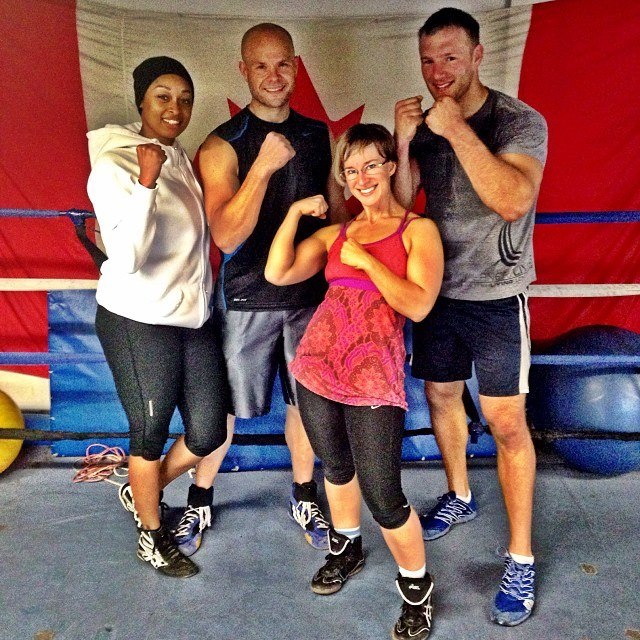
These suckaz have no idea I’m not a real jock.
